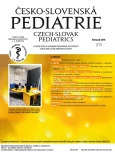Tubulointerstitial nephritis as a cause of acute renal insufficiency in children
Authors:
Ľ. Kováčiková ml.; M. Chocholová; Ľ. Podracká
Authors‘ workplace:
Detská klinika LFUK a NÚDCH, Bratislava
Published in:
Čes-slov Pediat 2018; 73 (7): 449-454.
Category:
Case Report
Overview
Tubulointerstitial nephritis (TIN) in children is a rare disease caused by multiple factors, the most commonly by drugs and/or infection. TIN is characterized by histologic findings of edema a and the presence of inflammatory cells in interstitium. Clinically, it manifests by various degree of renal dysfunction. In this article, we represent three cases of children aged between 10 and 16 years in whom non-oliguric acute renal failure occurred as a result of TIN.
The disease presented with nonspecific features including febrilities, tiredness, loss of appetite, vomiting, headache and abdominal pain. Laboratory tests showed raised of inflammatory markers and elevated serum creatinine 268–499 μmol/l and blood urea nitrogen 10.3–17.8 mmol/l. Urinary sediment was without specific findings. Twenty-four – hour urine test revealed proteinuria below 1 g/24 h, low glomerular filtration 17.4–23.4 ml/min and increased electrolyte excretion and decreased tubular reabsorption 86,4–92%. Ultrasonography showed difuse renal hyperechogenicity. In two patients renal biopsy was performed. In one case renal biopsy was not indicated because an etiology was recognized. Therapy included nephroprotective agents and also systemic corticoids in two patients. In all cases renal functions completely recovered within twelve months from the beginning of the disease. In one patient anterior uveitis was diagnosed following renal function recovery. Such condition is known as a TINU syndrome.
Conclusion:
Acute tubulointerstitial nephritis is an important cause of acute renal failure that manifests usually as a non-oliguric form. Elimination of evoking factor, nephroprotective therapy and eventually corticoids result in complete renal function recovery.
KEY WORDS
acute renal insufficiency, tubulointerstitial nephritis, uveitis
Sources
1. Dobrin RS, Vernier RL, Fish AL. Acute eosinophilic interstitial nephritis and renal failure with bone marrow-lymph node granulomas and anterior uveitis. A new syndrome. Am J Med 1975; 59 (3): 325–333.
2. Mandeville JT, Levinson RD, Holland GN. The tubulointerstitial nephritis and uveitis syndrome. Surv Ophthalmol 2001; 46 : 195–208.
3. Sessa A, Meroni M, Battini G. et al. Acute renal failure due to idiopathic tubulo-intestinal nephritis and uveitis: „TINU syndrome“. Case report and review of the literature. J Nephrol 2000; 13 (5): 377–380.
4. Tan Y1, Yu F, Qu Z, et al. Modified C-reactive protein might be a target autoantigen of TINU syndrome. Clin J Am Soc Nephrol 2011; 6 (1): 93–100.
5. Praga M, González E. Acute interstitial nephritis. Kidney Int 2010; 77 (11): 956–961.
6. Kovács L, Podracká Ľ. Proteinúria u detí. Pediatr prax 2012; 13 (1): 11–13.
7. Fogazzi GB, Ferrari B, Garigali G, et al. Urinary sediment findings in acute interstitial nephritis. Am J Kidney Dis 2012; 60 (2): 330–332.
8. Vidal E, Miorin E, Zucchetta P, et al. Usefulness of 99m Tc-dimercaptosuccinic acid renal scan in the diagnosis and follow-up of acute tubulointersticial nephritis in children. Clin Kidney J 2017; 10 (5): 655–660.
9. Clarkson MR, Giblin L, O´Connel FP, et al. Acute interstitial nephritis: clinical features and response to corticosteroid therapy. Nephrol Dial Transplant 2004; 19 (11): 2778–2783.
10. Jahnukainen T., Ala-Houhala M., Karikoski R, et al. Clinical outcome and occurence of uveitis in children with idiopathic tubulointerstitial nephritis. Pediatr Nephrol 2011; 26 (2): 291–299.
11. Sinnamon KT, Courtney AE, Harron C, et al. Tubulointerstitial nephritis and uveitis (TINU) syndrome: epidemiology, diagnosis and management. NDT Plus (2008) 1 (2): 112–116.
12. Štarha J, Sedlinský R, Doležel Z, et al. TINU syndrom – syndrom tubulointersticiální nefritidy a uveitidy. Čes-slov Pediat 1997; 52 (5): 304–306.
Labels
Neonatology Paediatrics General practitioner for children and adolescentsArticle was published in
Czech-Slovak Pediatrics

2018 Issue 7
- What Effect Can Be Expected from Limosilactobacillus reuteri in Mucositis and Peri-Implantitis?
- The Importance of Limosilactobacillus reuteri in Administration to Diabetics with Gingivitis
-
All articles in this issue
- Hearing loss and hearing impairment in chidhood
- History and present of cochlear implantations in Czechia
- Rehabilitation of hearing in childhood
- The present state in the newborn hearing screening and pre-school and school-age screening in the Slovak Republic
- Circulating endothelial and progenitor cells as biomarkers of angiogenesis in pediatric oncology patients
- Tubulointerstitial nephritis as a cause of acute renal insufficiency in children
- Heamophilia and treatment of inhibitor
- Possibilities of antibiotic treatment of acute otitis media
- Czech-Slovak Pediatrics
- Journal archive
- Current issue
- About the journal
Most read in this issue
- Possibilities of antibiotic treatment of acute otitis media
- Tubulointerstitial nephritis as a cause of acute renal insufficiency in children
- Hearing loss and hearing impairment in chidhood
- History and present of cochlear implantations in Czechia
